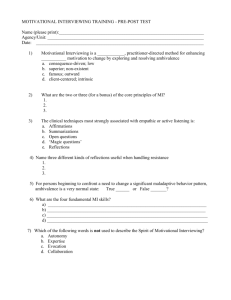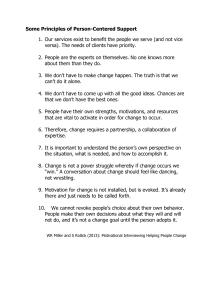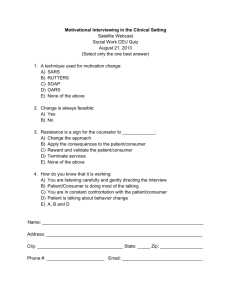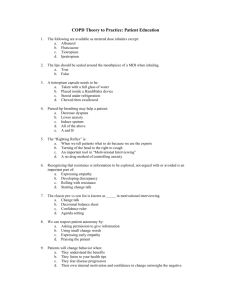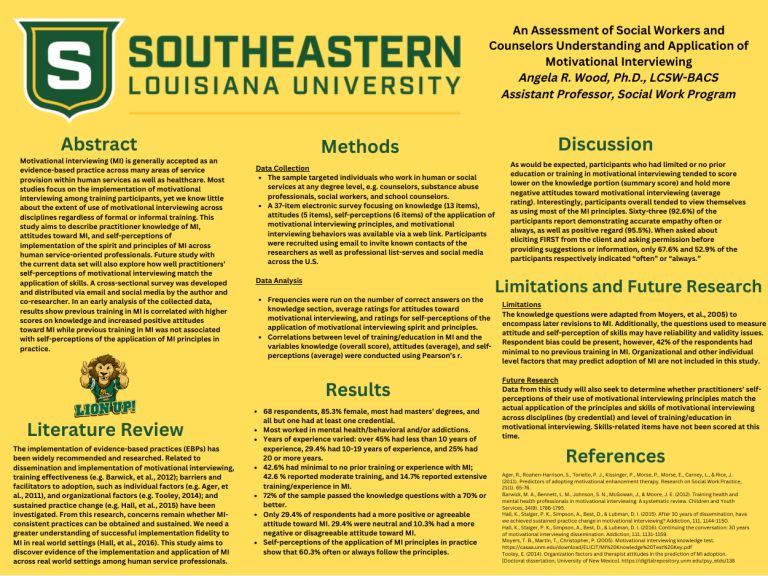
An Assessment of Social Workers and Counselors Understanding and Application of Motivational Interviewing Angela R. Wood, Ph.D., LCSW-BACS Assistant Professor, Social Work Program Abstract Motivational interviewing (MI) is generally accepted as an evidence-based practice across many areas of service provision within human services as well as healthcare. Most studies focus on the implementation of motivational interviewing among training participants, yet we know little about the extent of use of motivational interviewing across disciplines regardless of formal or informal training. This study aims to describe practitioner knowledge of MI, attitudes toward MI, and self-perceptions of implementation of the spirit and principles of MI across human service-oriented professionals. Future study with the current data set will also explore how well practitioners’ self-perceptions of motivational interviewing match the application of skills. A cross-sectional survey was developed and distributed via email and social media by the author and co-researcher. In an early analysis of the collected data, results show previous training in MI is correlated with higher scores on knowledge and increased positive attitudes toward MI while previous training in MI was not associated with self-perceptions of the application of MI principles in practice. Data Collection The sample targeted individuals who work in human or social services at any degree level, e.g. counselors, substance abuse professionals, social workers, and school counselors. A 37-item electronic survey focusing on knowledge (13 items), attitudes (5 items), self-perceptions (6 items) of the application of motivational interviewing principles, and motivational interviewing behaviors was available via a web link. Participants were recruited using email to invite known contacts of the researchers as well as professional list-serves and social media across the U.S. Data Analysis Frequencies were run on the number of correct answers on the knowledge section, average ratings for attitudes toward motivational interviewing, and ratings for self-perceptions of the application of motivational interviewing spirit and principles. Correlations between level of training/education in MI and the variables knowledge (overall score), attitudes (average), and selfperceptions (average) were conducted using Pearson’s r. Results Literature Review The implementation of evidence-based practices (EBPs) has been widely recommended and researched. Related to dissemination and implementation of motivational interviewing, training effectiveness (e.g. Barwick, et al., 2012); barriers and facilitators to adoption, such as individual factors (e.g. Ager, et al., 2011), and organizational factors (e.g. Tooley, 2014); and sustained practice change (e.g. Hall, et al., 2015) have been investigated. From this research, concerns remain whether MIconsistent practices can be obtained and sustained. We need a greater understanding of successful implementation fidelity to MI in real world settings (Hall, et al., 2016). This study aims to discover evidence of the implementation and application of MI across real world settings among human service professionals. Discussion Methods 68 respondents, 85.3% female, most had masters’ degrees, and all but one had at least one credential. Most worked in mental health/behavioral and/or addictions. Years of experience varied: over 45% had less than 10 years of experience, 29.4% had 10-19 years of experience, and 25% had 20 or more years. 42.6% had minimal to no prior training or experience with MI; 42.6 % reported moderate training, and 14.7% reported extensive training/experience in MI. 72% of the sample passed the knowledge questions with a 70% or better. Only 29.4% of respondents had a more positive or agreeable attitude toward MI. 29.4% were neutral and 10.3% had a more negative or disagreeable attitude toward MI. Self-perceptions of the application of MI principles in practice show that 60.3% often or always follow the principles. As would be expected, participants who had limited or no prior education or training in motivational interviewing tended to score lower on the knowledge portion (summary score) and hold more negative attitudes toward motivational interviewing (average rating). Interestingly, participants overall tended to view themselves as using most of the MI principles. Sixty-three (92.6%) of the participants report demonstrating accurate empathy often or always, as well as positive regard (95.5%). When asked about eliciting FIRST from the client and asking permission before providing suggestions or information, only 67.6% and 52.9% of the participants respectively indicated “often” or “always.” Limitations and Future Research Limitations The knowledge questions were adapted from Moyers, et al., 2005) to encompass later revisions to MI. Additionally, the questions used to measure attitude and self-perception of skills may have reliability and validity issues. Respondent bias could be present, however, 42% of the respondents had minimal to no previous training in MI. Organizational and other individual level factors that may predict adoption of MI are not included in this study. Future Research Data from this study will also seek to determine whether practitioners’ selfperceptions of their use of motivational interviewing principles match the actual application of the principles and skills of motivational interviewing across disciplines (by credential) and level of training/education in motivational interviewing. Skills-related items have not been scored at this time. References Ager, R., Roahen-Harrison, S., Toriello, P. J., Kissinger, P., Morse, P., Morse, E., Carney, L., & Rice, J. (2011). Predictors of adopting motivational enhancement therapy. Research on Social Work Practice, 21(1). 65-76. Barwick, M. A., Bennett, L. M., Johnson, S. N., McGowan, J., & Moore, J. E. (2012). Training health and mental health professionals in motivational interviewing: A systematic review. Children and Youth Services, 34(9). 1786-1795. Hall, K., Staiger, P. K., Simpson, A., Best, D., & Lubman, D. I. (2015). After 30 years of dissemination, have we achieved sustained practice change in motivational interviewing? Addiction, 111. 1144-1150. Hall, K., Staiger, P. K., Simpson, A., Best, D., & Lubman, D. I. (2016). Continuing the conversation: 30 years of motivational interviewing dissemination. Addiction, 111. 1131-1159. Moyers, T. B., Martin, T., Christopher, P. (2005). Motivational interviewing knowledge test. https://casaa.unm.edu/download/ELICIT/MI%20Knowledge%20Test%20Key.pdf Tooley, E. (2014). Organization factors and therapist attitudes in the prediction of MI adoption. [Doctoral dissertation, University of New Mexico]. https://digitalrepository.unm.edu/psy_etds/138
